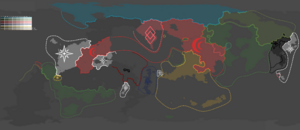Religion: Difference between revisions
mNo edit summary |
mNo edit summary |
||
| Line 1: | Line 1: | ||
| ⚫ | '''Religion''' is a range of social-cultural systems, including designated behaviors and practices, morals, beliefs, worldviews, texts, sanctified places, prophecies, ethics, or organizations, that generally relate |
||
| + | '''''See also:''' [[wikipedia:Religion|Wikipedia: Religion]]'' |
||
| − | The origin of religious belief is an open question, with possible explanations including awareness of individual death, a sense of community, and dreams. Religions have sacred histories, narratives, and mythologies, preserved in oral traditions, sacred texts, symbols, and holy places, that may attempt to explain the origin of life, the universe, and other phenomena. |
||
| ⚫ | '''Religion''' is a range of social-cultural systems, including designated behaviors and practices, morals, beliefs, worldviews, texts, sanctified places, prophecies, ethics, or organizations, that generally relate kerbals to supernatural, transcendental, and spiritual elements—although there is no clear definition of what precisely constitutes a religion. Different religions may or may not contain various elements ranging from the divine, sacredness, faith, and a supernatural being or beings. |
||
| − | Religious practices may include rituals, sermons, commemoration or veneration (of deities or saints), sacrifices, festivals, feasts, trances, initiations, matrimonial and funerary services, meditation, prayer, music, art, dance, or public service. |
||
| − | There are an estimated |
+ | There are an estimated 800 distinct religions accross the Kerbol System, though nearly all of them have regionally based, relatively small followings. Four Religions; Eubudism, Integralism, [Kraken Default], and [Zokesia Type] - make up a majority of the Kerbin's population. The religiously unaffiliated demographic includes those who do not identify with any particular religion, atheists, and agnostics, although many in the demographic still have various religious beliefs. |
| − | Many world religions are also organized religions, most definitively |
+ | Many world religions are also organized religions, most definitively Integralism and Eubudism, while others are arguably less so. |
==Trans-Religious Themes== |
==Trans-Religious Themes== |
||
| Line 30: | Line 29: | ||
===Commonality Religions=== |
===Commonality Religions=== |
||
| − | :: |
+ | ::''Greater Good'' |
| − | :: |
+ | ::''Integralism'' |
======'''Countries and territories with the greatest proportion of Integralists'''====== |
======'''Countries and territories with the greatest proportion of Integralists'''====== |
||
Revision as of 02:33, 17 January 2025
See also: Wikipedia: Religion
Religion is a range of social-cultural systems, including designated behaviors and practices, morals, beliefs, worldviews, texts, sanctified places, prophecies, ethics, or organizations, that generally relate kerbals to supernatural, transcendental, and spiritual elements—although there is no clear definition of what precisely constitutes a religion. Different religions may or may not contain various elements ranging from the divine, sacredness, faith, and a supernatural being or beings.
There are an estimated 800 distinct religions accross the Kerbol System, though nearly all of them have regionally based, relatively small followings. Four Religions; Eubudism, Integralism, [Kraken Default], and [Zokesia Type] - make up a majority of the Kerbin's population. The religiously unaffiliated demographic includes those who do not identify with any particular religion, atheists, and agnostics, although many in the demographic still have various religious beliefs.
Many world religions are also organized religions, most definitively Integralism and Eubudism, while others are arguably less so.
Trans-Religious Themes
The Sinking
Krakens
Classification
The academic practice of comparative religion divided religious belief into philosophically defined categories called world religions. Some academics studying the subject have divided religions into three broad categories:
- World religions, a term which refers to transcultural, international religions;
- Indigenous religions, which refers to smaller, culture-specific or nation-specific religious groups;
- New religious movements, which refers to recently developed religions which have not reached mainstream adoption.
Demographic classification
Specific Religions
Commonality Religions
- Greater Good
- Integralism
